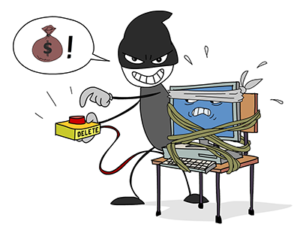Ransomware Attacks: The Unexpected Culprit Behind Your Therapist’s New Gray Hairs
It seems like the world of ransomware is more akin to a horror story than a tech issue, especially after a study by the Royal United Services Institute (RUSI) revealed the hair-raising effects these digital nightmares have on the mental well-being of small business owners and IT teams. Imagine the scene: entrepreneurs and tech wizards not just pulling their hair out over data breaches but also teetering on the brink of existential dread.
The plot thickens with the CISO stress report, stating that nearly half of these cyber-guardians are so stressed that even their stress has stress. They’re battling not just code and hackers but also the specter of anxiety and the phantom of job pressure, calling for a Ghostbusters team specialized in mental health.
Adding spice to this thriller, recent legal dramas involving tech moguls from Uber to SolarWinds have everyone questioning if their next security decision could land them in court. This Kafkaesque scenario, where regulations feel more punitive than protective, has led to a secret society of security professionals potentially hiding incidents like teenagers hide report cards.
As we dive deeper into this tale of digital doom, we encounter the saga of Change Healthcare, struck by a ransomware attack with consequences so dire, it makes the plot of your average disaster movie seem like a sunny day in the park. The fallout stretched from financial losses to a healthcare hiccup with providers counting pennies and patients missing critical treatments. Imagine, if you will, a healthcare CEO in Oregon now moonlighting as a magician, trying to make ends meet, while patients like a certain gentleman from Illinois are left wondering if their treatments might be a luxury.
The Florida Hospital Association’s Mary Mayhew called it: these attacks are not just cybercrimes but full-blown sieges on our critical infrastructure. With Russian hackers possibly pulling the strings behind the scenes, it’s like discovering your computer has been a double agent all along.
Now, let’s talk about the SEC’s latest plot twist: a mandate that demands companies to confess their cybersecurity sins within four days. Critics argue that these disclosures are more cryptic than helpful, leaving investors scratching their heads and companies scrambling to comply without revealing their entire hand of cards.
In the grand scheme of things, as the cyber bogeyman continues to haunt the digital corridors of large and small businesses, it’s clear that fighting this menace requires more than strong passwords and firewall incantations. It’s a call to arms—or, at least, to more empathetic corporate policies and a legal framework that doesn’t feel like it was drafted in the Dark Ages.
So, as we close this chapter on our modern-day cyber gothic novel, remember: the next time your computer asks you to update your software, it might just be trying to save you from becoming the protagonist in the sequel nobody wants to star in.
APR

About the Author:
Online Security Expert Todd Laff reviews online hacks and security issues and how to protect yourself and secure your network.